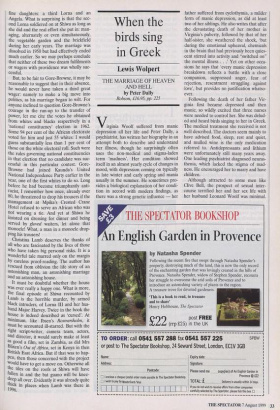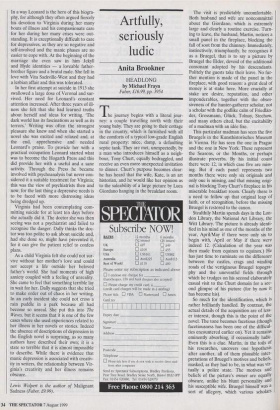When the birds sing in Greek
Lewis Wolpert
THE MARRIAGE OF HEAVEN AND HELL by Peter Dally Robson, £16.95, pp. 225 Virginia Woolf suffered from manic depression all her life and Peter Dally, a psychiatrist, has written her biography in an attempt both to describe and understand her illness, though he surprisingly often uses the non-medical and stigma-laden term 'madness'. Her condition showed itself in an almost yearly cycle of changes in mood, with depression coming on typically in late winter and early spring and mania usually in the summer. He sometimes pro- vides a biological explanation of her condi- tion in accord with modern findings, as there was a strong genetic influence — her father suffered from cyclothymia, a milder form of manic depression, as did at least two of her siblings. He also writes that after the devastating death of her mother in Virginia's puberty, followed by that of her half-sister, she weathered the shock, tut during the emotional upheaval, chemicals in the brain that had previously been quies- cent stirred into activity and "switched on" the mental illness . . .' Yet on other occa- sions he says that 'every manic depression breakdown reflects a battle with a close companion, suppressed anger, fear of rejection, resentment struggling against love', but provides no justification whatso- ever.
Following the death of her father Vir- ginia first became depressed and then manic, so wildly excited that three nurses were needed to control her. She was delud- ed and heard birds singing to her in Greek. The medical treatment she received is not well described. The doctors seem mainly to have advised food, sleep, rest and quiet, and mulled wine is the only medication referred to. Antidepressants and lithium were unfortunately still many years away. One leading psychiatrist diagnosed neuras- thenia, which lacked the stigma of mad- ness. He encouraged her to marry and have children.
Although attracted to some men like Clive Bell, the prospect of sexual inter- course terrified her and her sex life with her husband Leonard Woolf was minimal. In a way Leonard is the hero of this biogra- phy, for although they often argued fiercely his devotion to Virginia during her many bouts of illness and his compassionate care for her during her many crises were out- standing. It is exceptionally difficult to care for depressives, as they are so negative and self-involved and the manic phases are no easier to cope with. At the beginning of the marriage she even saw in him Jekyll and Hyde identities — a loveable father- brother figure and a brutal male. She fell in love with Vita Sackville-West and they had a lesbian affair and this was tolerated.
In her first attempt at suicide in 1913 she swallowed a large dose of Veronal and sur- vived. Her need for Leonard's constant attention increased. After three years of ill- ness she felt that she had learned truths about herself and ideas for writing. 'The dark world has its fascinations as well as its terrors.' Writing was often the strongest pleasure she knew and when she started a novel she was excited and relaxed and, at the end, apprehensive and needed Leonard's praise. To provide her with a practical occupation Leonard started what was to become the Hogarth Press and this did provide her with a useful and a sane activity. Through the Press he became involved with psychoanalysis but never con- sidered it a suitable treatment for Virginia; this was the view of psychiatrists then and now, for the last thing a depressive needs is to be faced with more distressing ideas being dredged up.
Virginia had been contemplating com- mitting suicide for at least ten days before she actually did it. The doctor she was then seeing was not a psychiatrist and failed to recognise the danger. Dally thinks the doc- tor was too polite to ask about suicide and, had she done so, might have prevented it, for it can give the patient relief to confess plans.
As a child Virginia felt she could not sur- vive without her mother's love and could not accept a life outside her beloved father's world. She had moments of high anxiety coupled with a feeling of unreality. She came to feel that something terrible lay in wait for her. Daily suggests that she tried to make order out of chaos in her writing. In an early incident she could not cross a rain puddle in a park because all had become so unreal. She put this into The Waves, but it seems that it is one of the few cases where she used experiences related to her illness in her novels or stories. Indeed the absence of descriptions of depression in the English novel is surprising, as so many authors have described their own; it is a state so terrible that it is almost impossible to describe. While there is evidence that manic depression is associated with creativ- ity in writers, the relationship between Vir- ginia's creativity and her illness remains obscure.
Lewis Wolpert is the author of Malignant Sadness (Faber, £9.99).



























































 Previous page
Previous page